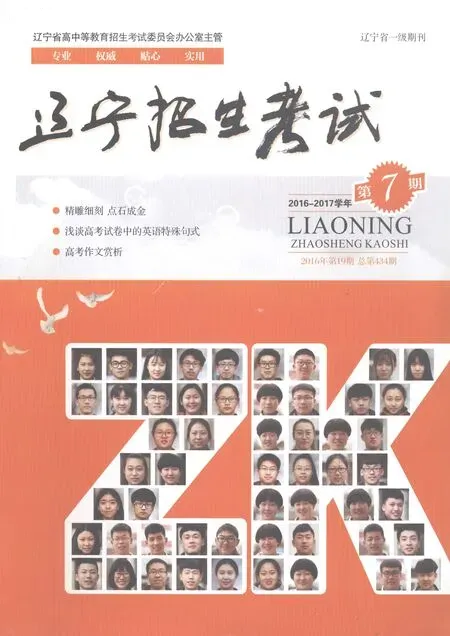高考试卷中的英语特殊句式
2017-03-11大连市第二十四中学李铁英
大连市第二十四中学 李铁英
英语的特殊句式一直是高考中的热点与难点。由于与学生熟悉的英语陈述句结构差异大,句式比较杂乱,学生掌握起来有一定的难度。笔者试以2016年高考真题中出现的特殊句式为主要例句,简单讲解特殊句式中的强调句、倒装句及省略句的结构、高考易错点及使用它们提高高考写作的小技巧。
一、强调句的基本结构及高考难点
强调句是为了使句子的部分内容突出而采用的一种修辞手段。
1.强调句的基本句型是“It is/was+被强调部分(通常是主语、宾语或状语)+that/who(当强调主语且主语指人)+其他部分”。
例句:(2016·天津卷)You are waiting at a wrong place.It is at the hotel_____the coach picks up tourists. (正确答案为:that)
2.如果需要强调谓语时,使用助动词“do/does或did+动词原形”的结构。
例句:(2016·北京卷)However, when something_____interest me,I could become absorbed.(正确答案为:did)
注意:①not...until...句型的强调句是 “It is/was not until+被强调部分 +that+其他部分”。
例句:(2016·浙江卷)It was not until I became involved in student government_____I gained the confidence to handle projects that I created with the help of ASUCR Office of the President.(正确答案为:that)
②强调句中的连接词一般只用that,who,即使在强调时间状语和地点状语时也如此。学生在改错中尤其容易忽视这一点。
请看下文这个改错:
It was not until then when the term “Canada”entered the country's history.
正确答案为:when改为that。强调句掌握不熟练的学生常常误以为此句为定语从句或状语从句。
③强调谓语时只用do/does和did,没有别的形式。
二、倒装句的基本结构及高考难点
颠倒原有语序的句式叫做倒装句。为方便高考复习,可以把高考常见的倒装句分为全部倒装句3种,部分倒装句3种及其他倒装句3种。
1.全部倒装是将句子中的谓语动词全部置于主语之前。此结构通常只用于一般现在时和一般过去时。常见的结构有:
(1)here,there,in,out,up,down,then,thus 等副词置于句首,谓语动词常用 be,come,go,lie,run 等。
例句:(2016·天津卷)Then_____ (come)the final awards ceremony at the end of the year.(正确答案为:came)
注意:上述全部倒装的句型结构的主语必须是名词,如果主语是人称代词则不能完全倒装。
例句:Here he comes.
(2)表方位的地点状语放句首,谓语动词常用be,remain,lie,sit,stand 等。
例句:(2010·重庆卷) At the meeting place of the Yangtze River and the Jialing River_____(lie)Chongqing,one of the ten largest cities in China.(正确答案为:lies)
(3)表语提前放句首。
例句:(2016·全国Ⅰ卷)In this box_____(be)some stem cells that are urgently needed for a patient. (正确答案为:are)
注意:there be结构也属于全部倒装的句型结构,be动词的使用遵循就近原则。
例句:There are various means of communicating with strangers.
2.部分倒装是把助动词、情态动词、be动词放在主语之前。常见的结构有:
(1)含有否定意义的副词、连接词放在句首。
表示否定的副词有 never,nor,neither;
表示半否定意义的副词有hardly,few,seldom,little;
含有 no和 not的词组有 by no means,in no case,at no time,under no circumstances,not until,notonly...butalso,no sooner...than=hardly...when/scarcely...when。
例 句 :(2016·江 苏 卷 ) Not untilrecently_____they encourage the development of touristrelated activities in the rural areas.(正确答案为:did)
注意:只有当not only...but also连接两个分句时,才在第一个分句用倒装结构。如果置于句首的not only...but also仅连接两个并列词语,不可用倒装结构。
例句:(2014·大纲全国卷)Not only_____the nurses want a pay increase, they want reduced hours as well. (正确答案为:do)
(2)only修饰状语(从句)且放在句首时。
例句:(2016·全国Ⅰ卷)Only after a year of friendly discussion_____Ms Gaf finally say yes.(正确答案为:did)
(3)当“so/such...that...”结构中的 so, such 连同它所直接修饰的成分位于句首时,主句要进行倒装(that后面的结果状语从句不倒装)。
例句:(2009·广东卷)So sudden_____ (be) the attack that the enemy had no time to escape.(正确答案为:was)
3.其他高考常见的倒装结构有:
(1)“so (nor, neither)+助动词/情态动词/be 动词+主语”。表示前面叙述的情况(否定情况)也适合于另一个人或物,意为“也,同样,也如此”。
例句:(2016·北京卷)If that happened, Seppala might fall into the icy water below.He would die, and so_____the sick children of Nome.(正确答案为:would)
注意:①这一句型倒装部分的助动词、情态动词、连系动词的时态和形式要与前句及全句语义一致。
②表示前面的多种情况也适合于另一人或物,或者既有肯定又有否定情况或涉及到不同类型的动词时可用:“It is the same with sth./sb. ”或“So it is with sth./sb.”句型。
例句:She does well in English,but is poor in maths.So it is with Lucy.
③当so表示对前句内容的肯定、符合,或进一步强调前面所说的情况,或者赞同前面的说法时,应用自然语序。意为 “的确,正是”。
例句:—Tom works hard.汤姆工作很卖力。
—So he does and so do you. 的确如此,你也是。
(2)由as、though引导让步状语从句要倒装。结构为“表语/状语/动词原形+as+主语+其他”。
例句:(2016·天津卷)Here I learned my first important lesson:_____ (disable)as I was in language,I could still be smart and well express myself with clay.(正确答案为:Disabled)
注意:①句首是实义动词,其他助动词放在主语后。如果实义动词有宾语和状语,随实义动词一起放在主语之前。
例句:(2011·全国卷)Try hard_____she might,Sue couldn't get the door open. (正确答案为:as)
②句首名词不能带任何冠词。
例句:Child as he is, he knows a lot.
(3)if虚拟条件句中,若从句谓语动词有 were,should,had 时,省略 if,将 were, should, had 提前到从句句首构成倒装。
例 句 :If it hadn't been for their help, we couldn't have finished the work on time.
=Hadn't it been for their help,we couldn't have finished the work on time.
三、省略句的基本结构及高考难点
省略是为了使句子更简洁,同时又不影响句子意义的表达。常见的结构有:
1.功能词的省略
功能词指的是没有完整意义,但有语法意义的词,如冠词、介词、助动词等。
(1)冠词的省略
①两个并列的名词前面,第二个可以省略。
例句:A man and (a) woman are talking in the office.
注意:如果省去冠词会误会为一个人则不省略。
②表示独一无二的职位前,比如总统、主席、班长等,习惯省略冠词。
例句:They elected John monitor of the class.
(2)介词的省略
have difficulty/problem/trouble+(in)+doing
spend/waste time/energy+(in)+doing
there is no sense/point+(in)+doing
stop/prevent sb.+(from)+doing
be busy+(in)+doing
take turns+(at)+doing
have a good/great/fun/hard/time+(in)+doing
(3)that的省略
①引导宾语从句的that常常可以省略。
例句:I suggested (that) we should go home.
注意:a.两个宾语从句连用时,第一个从句that可以省略,第二个从句的that不可省略。
例 句 :The teachertold the students (that)they should hand in their homework the next day and that the homework must be signed names by their parents.
b.在介词短语后的宾语从句中that不可省略,且前面往往有个形式宾语it。
例句:You may depend on it that they will support your plan.
See to it that you arrive at the railway station on time.
c.在双宾语结构中,that从句充当直接宾语或是间接宾语时,不可以省略that。
例句:He has told me that he will go to Shanghai tomorrow.
②引导定语从句并在从句中作表语或宾语that可省略。
例句:Can I have the records (that) I lent you?
2.句子结构的省略
(1)主语的省略
英语中的主语一般不可省略,但在口语中某些惯用表达也可省略,有时主语和助动词一起省略。
例句:(2016·浙江卷)—The movie starts at 8:30,and we can have a quick bite before we go.
—_____(sound) great.See you at 8:10. (正确答案为:Sounds)
(2)状语从句的省略
在 when,while,whenever, till,as soon as,if,unless, as if,though,as, whether引导的状语从句中,若谓语有be动词,而从句主语又跟主句主语相同或从句为it+be动词时,则主句的主语和be常可省略。
例句:(2016·全国Ⅰ卷)Other cultures may use silence in other ways, particularly when________ (deal) with conflicts among people or in relationships of people with different amounts of power.(正确答案为:dealing, when dealing=when other cultures are dealing)
(3)虚拟语气中should的省略
在与 suggest, request, order, advise 等词相关的名词性从句中必须用虚拟语气 “should+动词原形”形式,should可省略。
例句:(2016·全国Ⅱ卷) Some classmates suggest we can go to places of interest nearby. (此题为改错。正确答案为:can改为should或can删掉,第二种改法就意味着省略should)
(4)省略一个从句或从句的一部分,可用so或not代替。常用的动词有 believe,think,expect,guess, hope, imagine, suppose, be afraid 等。
例句:—Is he feeling better today?
—I'm afraid not. (not=he is not feeling better today)
(5)动词不定式的省略
不定式作某些动词的宾语,宾补或主补时或作某些形容词的状语时,常常省略到to。常见动词有like, love, hope, wish, expect, mean, want等。常见的形容词有 happy, glad, eager, anxious,willing, ready等。
例句:She wants to come but her parents won't allow her to.
I think she should get a job,but you can't force her if she's not ready to.
注意:①当不定式含有作助动词用的have或be的形式时,要保留到原形have或be。
例句:He did not come,but he ought to have.
He is not the man he used to be.
②不定式to的省略
a.主语部分有to do,系动词是is/was时,作表语的不定式省略to。
例句:The only thing you have to do is (to)press the button.
b.作介词 but, except, besides的宾语,前面有实义动词do的各种形式时,常省略to。
例句:Tom had nothing to do besides answer letters this morning.
③ 在 see, watch, notice, observe, look at,hear, listen to, feel, have, make, let等词后作宾语补足语时省略to.
四、特殊句式在高考写作中的使用
高级词汇和复杂句式的使用是衡量高中生英语写作水平的一个重要指标。许多学生在英语写作中能够表述清楚自己希望表达的意思,但是单一的句式结构使作文单调乏味,请看下面这段表达感谢的学生作文:
In the past three years,I have learned much knowledge.I have made many good friends.I have made such great progress with your help.
这段叙述语义清晰,但句式单调,学生反复使用I have done...句式。改为适当的特殊句式后,本文可以是这样的:
In the pastthree years, notonly have I learned much knowledgebut alsoIhavemade many good friends.It is with your help that I have made such great progress.
显然,特殊句式的恰切使用可以使作文大大增色。英语写作中最常用的特殊句式包括:
1.使用“There be sb.doing sth.”句型描述现象或概括原因。
例句:At present, there are a lot of students cheating in the examinations.
Nowadays,there are more and more people purchasing private cars.
There are many factors contributing to/accounting for the phenomenon.
2.使用“Here is/are...”倒装句引出下文。
例句:Here is my advice./Here are my tips.
Here is the brief introduction to sth.
3.使用“It is/was+被强调部分+that+其他部分”句式陈述活动的原因、目的、结果或意义等。
例句:Itis the environmentpollution that causes this problem.
It is our attitude that matters/counts.
It is the achievements that havemademe confident.
4.使用“名词 /形容词 /副词+as/though+主语+谓语……”倒装句表达转折关系。
例句:Tough though the problem is, we will give up by no means.
5.使用“Not only...but also...”倒装句表达并列关系。
例句:Not only do computers play an important part in science and technology,but also they play an informative role in our daily life.
Not only should the government adopt effective measures but everyone of us should play an active part.
6.使用“Only+ 状语(从句)...”倒装句总结并简洁有力地结尾。
例句:Onlyin this waycan wesolvethe problem.
Only if we can unite together are we more likely to solve the problem well.
以上是特殊句式在高考中的常见用法。归根到底,能根据高考题的语境和自己写作的需要正确恰当地使用句型才是关键,生搬硬套往往导致过犹不及。相信同学们在适当练习后一定能够熟练掌握特殊句式用法。
